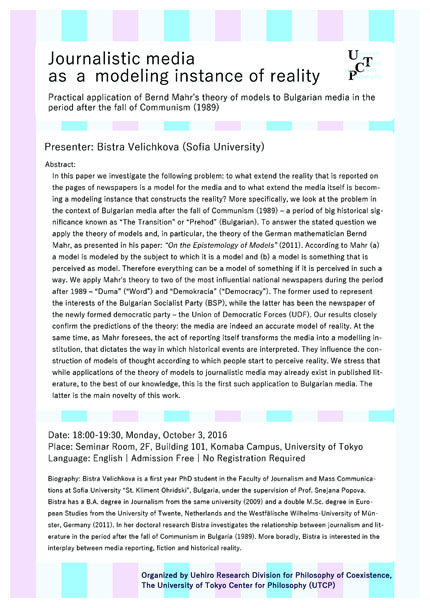
|
Title: | Journalistic media as а modeling instance of realityFinished |
||
|---|---|---|---|---|
| Date: | 18:00-19:30, Monday, October 3, 2016 |
Place: | Seminar Room, 2F, Bldg 101, Komaba Campus, University of Tokyo |
|
Journalistic media as а modeling instance of reality
: Practical application of Bernd Mahr's "theory of modes" to Bulgarian media in the period after the fall of Communism (1989)
Presentor: Bistra Velichkova
Abstract
In this paper we investigate the following problem: to what extend the reality that is reported on the pages of newspapers is a model for the media and to what extend the media itself is becoming a modeling instance that constructs the reality? More specifically, we look at the problem in the context of Bulgarian media after the fall of Communism (1989) – a period of big historical significance known as “The Transition” or “Prehod” (Bulgarian). To answer the stated question we apply the theory of models and, in particular, the theory of the German mathematician Bernd Mahr, as presented
in his paper: “On the Epistemology of Models” (2011). According to Mahr (a) a model is modeled by the subject to which it is a model and (b) a model is something that is perceived as model. Therefore everything can be a model of something if it is perceived in such a way.
We apply Mahr's theory to two of the most influential national newspapers during the period after 1989 – “Duma” (“Word”) and “Demokracia” (“Democracy”). The former used to represent the interests of the Bulgarian Socialist Party (BSP), while the latter has been the newspaper of the newly formed democratic party – the Union of Democratic Forces (UDF). Our results closely confirm the predictions of the theory: the media are indeed an accurate model of reality. At the same time, as Mahr foresees, the act of reporting itself transforms the media into a modelling institution, that dictates the way in which historical events are interpreted. They influence the construction of models of thought according to which people start to perceive reality.
We stress that while applications of the theory of models to journalistic media may already exist in published literature, to the best of our knowledge, this is the first such application to Bulgarian media. The latter is the main novelty of this work.
Biography: Bistra Velichkova is a first year PhD student in the Faculty of Journalism and Mass Communications at Sofia University “St. Kliment Ohridski”, Bulgaria, under the supervision of Prof. Snejana Popova. Bistra has a B.A. degree in Journalism from the same university (2009) and a double M.Sc. degree in European Studies from the University of Twente, Netherlands and the Westfälische Wilhelms-University of Münster, Germany (2011). In her doctoral research Bistra investigates the relationship between journalism and literature in the period after the fall of Communism in Bulgaria (1989). More boradly, Bistra is interested in the interplay
between media reporting, fiction and historical reality.

Organized by: Uehiro Research Division for the Philosophy of Co-existence, UTCP






